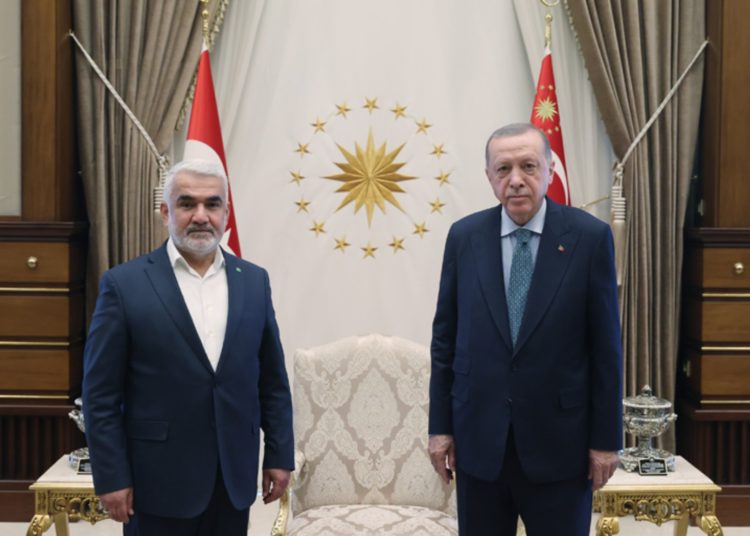Abdullah Bozkurt/Stockholm
The recent release of two Hizbullah members serving life sentences — convicted of murder and attempting to overthrow the democratic government through violence — by Turkish President Recep Tayyip Erdogan on alleged health grounds is not an isolated incident. Rather, it reflects a longstanding pattern rooted in the alliance between Erdogan’s ruling Justice and Development Party (AKP) and Turkey’s Hizbullah.
On March 29 Erdogan issued a presidential decree granting clemency to Şehmus Alpsoy and Hamit Çöklü, both serving life sentences, invoking deteriorating health as the official rationale.
Regardless of the veracity of their medical conditions, the decision is emblematic of a broader, longstanding pattern. For over a decade, the pro-Iran AKP government has systematically enabled the release of convicted Hizbullah militants through a variety of legal and procedural mechanisms — including orchestrated retrials culminating in predictable acquittals, the exclusion of previously accepted evidence, negotiated settlements, early parole and presidential amnesties.
To date, approximately 400 Hizbullah members have been released from Turkish prisons, a leniency starkly denied to political prisoners, journalists, activists and critics of President Erdogan — many of whom have been incarcerated merely for exercising their constitutionally protected right to free expression.
In striking contrast to the preferential treatment extended to Hizbullah convicts, Turkish courts routinely reject early release petitions from political detainees, even those suffering from severe or terminal health conditions. Some have effectively been sentenced to death behind bars, enduring inhumane and degrading prison conditions.
On March 29, 2025, Turkish President Erdogan issued a presidential decree pardoning two Hizbullah members who were convicted of serious charges and were serving life sentences:
According to court documents, Alpsoy assisted his father, Mehmet Emin Alpsoy — a senior figure in Hizbullah — during the torture and murder of three individuals. He drove the vehicle as his father transported the victims to be buried in the basement of a storage facility owned by Alpsoy’s uncle in Ankara’s Etimesgut district.
Both father and son were subsequently tried and convicted on charges including attempting to overthrow Turkey’s constitutional order through acts of terrorism and violence. In 2005 the Ankara 11th High Criminal Court sentenced them each to life imprisonment.
It is worth noting that President Erdogan had already granted amnesty to Mehmet Emin Alpsoy in May 2023, likewise citing health concerns. His son’s pardon in late March of this year followed in a similar fashion, reinforcing the perception of selective clemency favoring convicted Hizbullah members.
Çöklü was arrested in 1998 and later tried in a separate Hizbullah case in Turkey’s Adana province. In 2007 the Adana 7th High Criminal Court convicted him — along with 10 others — on multiple charges, including the murder of 24 people, among them a Kurdish lawmaker and a prominent feminist writer.
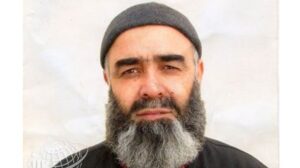
The Turkish judiciary, now effectively under the control of President Erdogan’s government, has been systematically weaponized for over a decade to advance the political interests of the ruling party. While it has shielded pro-Erdogan groups, such as Hizbullah, from legal accountability, the judiciary has relentlessly targeted Erdogan’s opponents and critics, subjecting them to brutal prosecution and repression.
One of the principal targets of this crackdown has been the Gülen movement — a faith-based organization that vehemently opposes Erdogan’s polarizing political Islamist agenda. The movement has consistently criticized his regime for pervasive corruption, widespread human rights violations and its facilitation of radical jihadist groups, both within Turkey and internationally.
Hizbullah attributes the previous crackdown on its network to Gülen followers, asserting that its members were unjustly prosecuted, tried and convicted in the courts. Nearly 5,000 judges and prosecutors in Turkey, allegedly affiliated with the Gülen movement, were purged from their positions by the Erdogan government, with many being imprisoned on fabricated charges. Among those purged were judges and prosecutors who had previously been involved in the prosecution and trial of Hizbullah members.
The release of Hizbullah members began with a covert alliance struck between the terrorist group and Erdogan in 2014, which was formalized in 2018 when Hizbullah’s political arm, Hür Dava Partisi (Free Cause Party, HÜDA-PAR), officially joined the AKP-led electoral alliance. In the 2023 elections Hizbullah secured three seats in parliament for the first time, running on the ruling AKP ticket under Erdogan’s leadership.
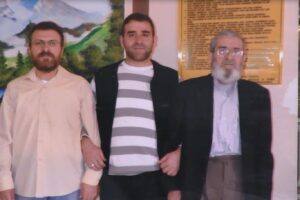
The alliance with Erdogan and the acquisition of a platform in parliament provided Hizbullah with ample opportunity to expand its pro-Iranian ideology and radical views, particularly its antisemitic narrative. This rhetoric has targeted Turkish-Israeli dual nationals and Jews while also advocating for amendments to fundamental constitutional articles along religious lines.
In October 2023 Hizbullah’s supreme leader, Gümüş, made a public call for a global jihad against Israel. In a statement published by İlke Haber Ajansı (Ilke News Agency, ILKHA), a media outlet affiliated with Hizbullah, Gümüş urged, “Hurry up for jihad. Come to jihad and come to salvation. Especially those of you who are neighbors and close to the lands of Palestine, do not leave our Gazan brothers alone. Render the borders meaningless, pour in and join your Palestinian jihadist brothers.” He further emphasized that Muslims around the world must find ways to contribute to the jihadist cause.
Although distinct from Lebanon’s Hezbollah, Turkey’s Hizbullah has maintained a longstanding alliance with Iran, receiving funding from Iranian intelligence. Some of its leaders, including the supreme religious leader Gümüş, continue to reside in Iran. The group primarily caters to Turkey’s Kurdish population and, during the 1990s, covertly collaborated with Turkish intelligence and military forces in a brutal crackdown on the Kurdistan Workers’ Party (PKK), committing numerous mass murders.
The initial unraveling of the Hizbullah network began in 2000 with a major police operation in Istanbul, which resulted in the death of then-Hizbullah leader Hüseyin Velioğlu and the capture of key figure Gümüş. These arrests led to the discovery of mass graves and torture chambers across the country, exposing the full extent of the group’s violence, which had claimed the lives of hundreds of individuals.
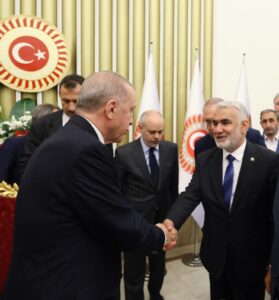
In response to the crackdown, Hizbullah adopted a low-profile strategy and shifted tactics to ensure its survival. During Erdogan’s first two terms in office, the group quietly reorganized itself through various foundations, associations and other entities. In 2010 several of its leaders were released from prison pending the conclusion of their trials, after which they became fugitives. In December 2012 the group formally established the HÜDA-PAR political party with the backing of the Erdogan government, which facilitated the party’s entry into the political arena.
Erdogan disregarded Hizbullah’s bloody past, breathing new life into the organization and facilitating the release of most of its convicted members from prison. Among those freed was Enver Kılıçarslan, who had been sentenced to seven-and-a-half years in prison in February 2002 for his membership in Hizbullah. Trained in Iran in 1987, Kılıçarslan served under the late Turkish Hizbullah leader Velioğlu. Today he coordinates Hizbullah’s outreach activities with Hamas, Palestinian Islamic Jihad and other radical Islamist organizations globally.
The government also permitted the re-establishment of banned Hizbullah-affiliated organizations, such as Mustazaf-Der (short for “The Oppressed,” or Mustazaflar ile Yardımlaşma ve Dayanışma Derneği in Turkish).
Confidential documents obtained by Nordic Monitor show that Turkish police and military intelligence units had in the past mapped out the money trail leading to Mustazaf-Der and other Hizbullah-linked entities and individuals from Iran. The documents, incorporated into a terrorism investigation of the Islamic Revolutionary Guard Corps (IRGC) Quds Force, identified the transfer of half a million dollars from Iran to Hizbullah in February 2012 alone.
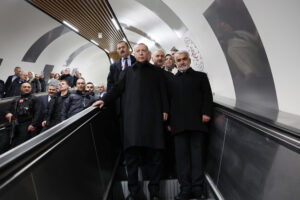
A report filed by the counterterrorism bureau of the Diyarbakır police department on May 9, 2012 stated that Hizbullah received $100,000 every month from Iran in addition to lump-sum payments for special operations. It said Mehmet Hüseyin Yılmaz, the head of Mustazaf-Der; Mehmet Göktaşa, the owner of Hizbullah publication Doğru Haber; and Sait Gabari and Fikret Gültekin, Hizbullah propagandists, received half a million dollars from Iran in February 2012. It also added that Iran sent $10,000 to the family of Ubeydullah Durna, a Mustazaf member who was killed by the PKK in the town of Yuksekova near Turkey’s border with Iran on May 5, 2011.
The report further revealed that Iran set up a special unit in Hizbullah for espionage and surveillance in Turkey to monitor military activities, especially around NATO installations. Members of this group were selected from people who worked in government jobs and the media for easy access to sensitive sites and installations. It underlined that the unit ran surveillance of a NATO radar base in Malatya province, photographed and videotaped the base and its surroundings and passed the results to its Iranian handlers.
In February 2014 the Erdogan government dismissed judges, prosecutors and police chiefs who had been investigating Hizbullah and the Iranian Quds Force network in Turkey. The government halted all ongoing probes and allowed the suspects to evade legal consequences.
Now Hizbullah, with its political party, associations, foundations, media outlets, charity groups and other networks, is rapidly expanding in Turkey, especially among Kurds as well as in a number of European countries.

